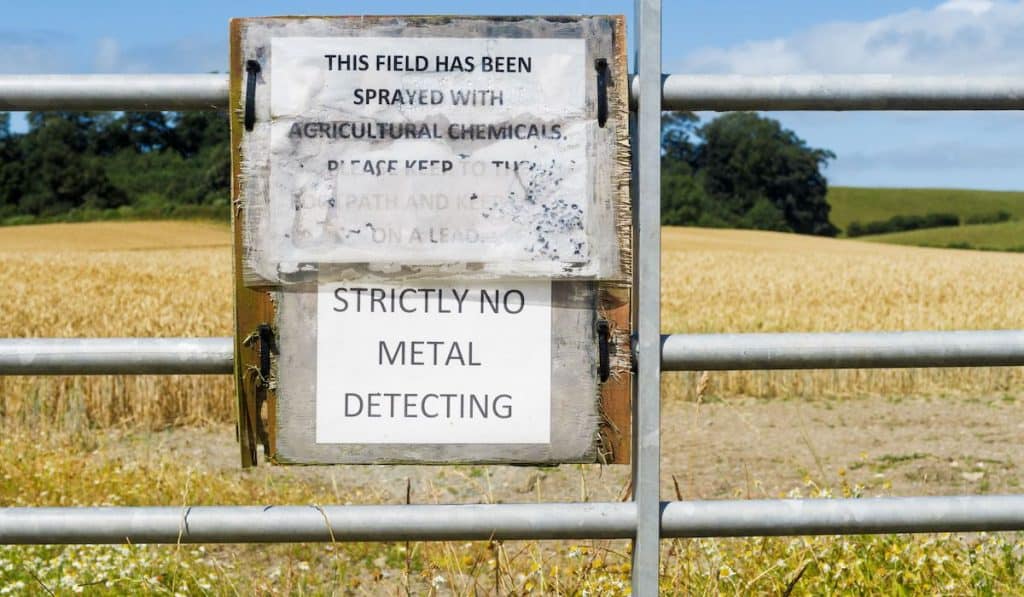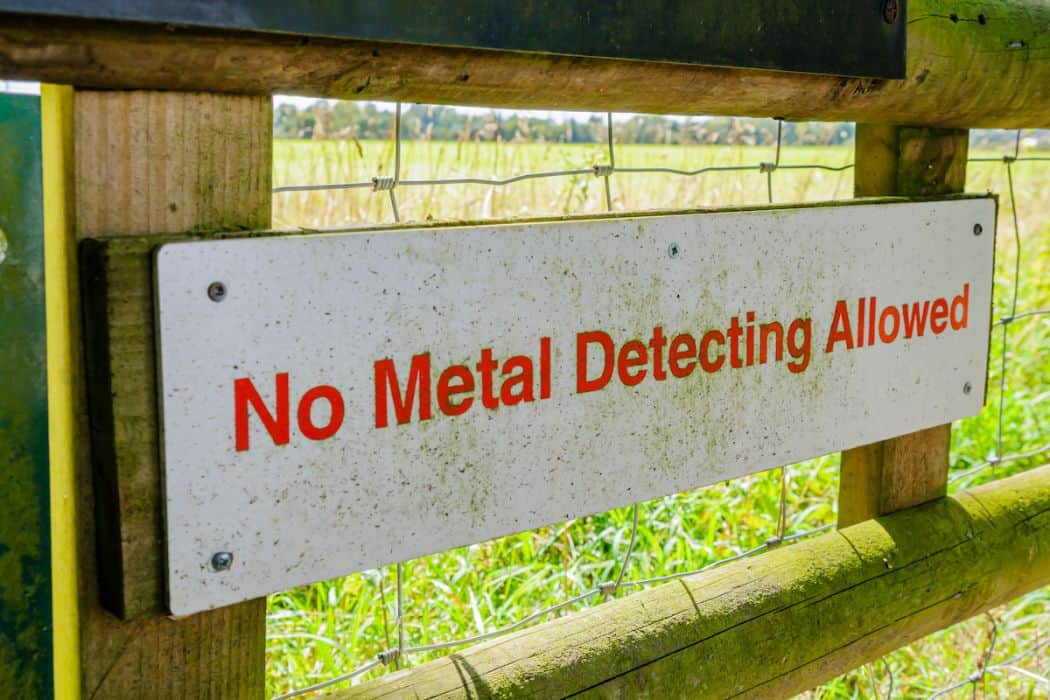If you have fallen in love with metal detecting, you may be tempted to go at it in every possible place. Unfortunately, the law won’t allow you to search for metals wherever you want.
That’s why it’s essential to know what the law says about where you are allowed and where you cannot comb for metals.
You cannot metal detect on private property or places with historical significance. Also, places of worship and cemeteries due to grave and treasure robbers. Metal detecting of any kind is expressly forbidden in all areas covered by national parks, monuments, and antiquities laws. Archaeological sites are off-limits for metal detectors. Looking for and retrieving artifacts at any heritage and archaeological sites is a punishable offense.
Let’s uncover some of the strictly forbidden places below, so you’ll know where not to go.
What does the law say about metal detecting permissions?
Before we dive right in, it’s important to know that there’s no universal law in all the states about metal detecting. What’s allowed in one place may be forbidden in another state.
The same goes for municipal laws in the different counties. The regulations are so vastly different that you’ll have to do your independent research on the laws in your county, city, or state.
It’s best to join a metal detecting club or social forum in your area so you can get all the updated information.
That said, there are some cross-cutting themes in most laws that stop metal detecting in certain places.
Some explicitly state that it’s forbidden, while other laws imply the same. It’s best to stay away from these and similar sites.
Nationally Protected Sites
Metal detecting of any kind is expressly forbidden in all areas covered by national parks, monuments and antiquities laws.
These sites are entirely off-limits. You are not even allowed to bring a metal detector, sub-bottom profiler, or any kind of metal detecting hardware to any of these places.
If you get caught with metal detecting tools on you, that’s enough to get you prosecuted. It’s even worse if they see you using them.
Therefore, it’s best to stay away from any of these sites altogether.
To remain on the safe side of the law, avoid metal detecting in areas near these federally protected areas.
For example, it’s a good idea not to go near any waters or part of the seashore that’s right next to a national park.
That’s because while you are searching for metal, it’s easy to get distracted, and you may end up wandering over the boundary line.
You also have to ask Federal authorities or state authorities near you to know which parts fall under the national parks and which ones don’t.
You can’t detect metal on any place protected and listed in the national register of historic places.
This includes any new site that may be added to the National record. Check the national database or the park’s website to determine the status of any site.
Check out our complete guide to metal detecting here!
Private property without permission
Metal detecting on private property without express permission is not allowed. If you don’t get permission from the owner of the property, avoid going there.
Making assumptions about any form of implied consent might get you into a lot of trouble.
Whenever possible, get permission in writing; this helps clear any misunderstandings. Plus, if someone doubts or suspects you of trespassing, it’s easier to show them written permission.
Almost all private property is acceptable to metal detect once you get the proper permissions; however, it’s essential to check if they are no protected areas within the property.
For example, if a historical burial site lies inside a piece of private land, the whole property becomes off-limits to metal detectors.
Do some due diligence before you decide on the right places to metal detect.

Archaeological sites
Any known archaeological site is off-limits for metal detectors. Looking for and retrieving artifacts at any heritage and archaeological sites is a punishable offense.
It’s best to go as far as you can from any archaeological site and its surrounding areas.
If you stumble upon an archaeological finding even in a permitted place, it’s important to take it into the County or State authorities.
If you keep it to yourself, there’s a chance you might land yourself in trouble.
Civil and revolutionary war battlefields
Battlefields may be full of treasures and historical artifacts, but the law does not allow metal detecting in those areas.
Any civil war battlefields that the federal government officially recognizes like Gettysburg in Pennsylvania, Shiloh in Mississippi, or Appomattox in Virginia are strictly no-go areas for detecting.
That said, searching for civil war bullets is still possible. Many battles took place on private property, so you can simply get permission and go on your treasure hunt.
Historical burial grounds
The law protects known historic burial grounds, such as native American burial grounds. If you come across any areas like this, it’s best to turn the other way.
Unfortunately, some of the native American burial grounds are not marked, so it’s hard to tell. To make matters worse, ignorance of the law is never a defense.
To stay on the safe side, avoid wandering into areas you don’t know too well, and try to research as much as you can about any private property.
Can I metal detect in Graveyards and Cemeteries?
The law doesn’t stop you from metal detecting in cemeteries as long as they don’t fall under Federal land or historical and antiquities protection.
However, metal detecting in graveyards may come across to some people as immoral, unethical, or downright creepy.
If you are okay with treasure hunting in cemeteries ( which is entirely your choice), just remember not to deface or rob graves.
What to remember when metal detecting
It’s important to always verify the permissions in any given area. Never make assumptions because the laws are different in each place, and they can change at any time.
Try to get as much information as possible about these places, so you don’t get into trouble with the law.
Understanding all the rules and reading through the legal jargon can take time and be such a snooze fest.
So, where CAN you metal detect? Here’s a good article explaining where are the best places to metal detect without fear of prosecution.
As mentioned before, it may be a good idea to join a metal detecting club or get in touch with more experienced metal detectorists, so you can just ask.
If you follow the law and stay away from protected places, national battlegrounds, and native American burial grounds, you shouldn’t run into any problems with the law.
It’s important to always get the right permission, preferably in writing, for any private property.
Most importantly, respect the land and be sure to cover holes. Remember that anything you find that’s older than 50 years belongs to the state, and you’re not allowed to take it with you.
So, enjoy your hobby but stay on the right side of the law!




